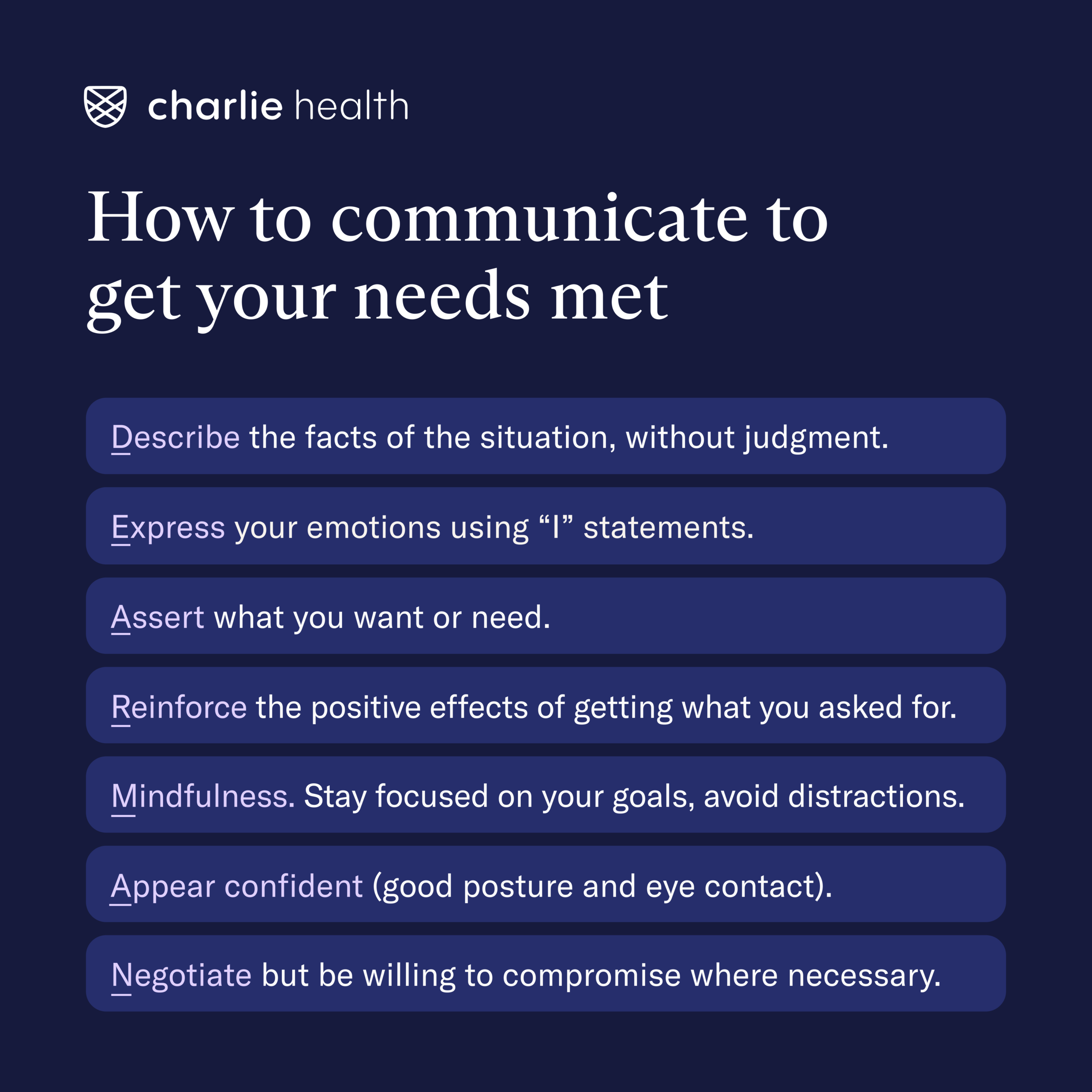
Table of Contents
DBT Skills: DEAR MAN
Written By: Charlie Health Editorial Team

Clinically Reviewed By: Dr. Don Gasparini
March 22, 2023
4 min.
DEAR MAN DBT skills are easy-to-follow guidelines for everyday use that, with practice, can help you improve your communication skills and emotional regulation in relationships.
Learn more about our Clinical Review Process
Table of Contents
Dialectical Behavior Therapy (DBT) is a form of therapy that has become increasingly popular in recent years. It has been found to be helpful for a range of mental health conditions. DBT offers a range of skills that can help individuals manage difficult emotions and improve their relationships. One of the most effective DBT skills for interpersonal communication is DEAR MAN.
What is DEAR MAN?

DEAR MAN is an acronym for a DBT skill that is used to help promote effective communication. The acronym stands for the following:
D – Describe the situation
This involves providing a clear, factual description of the situation you are dealing with. This can help to prevent misunderstandings and ensure that both parties are on the same page.
E – Express your feelings
In this step, you express how the situation is making you feel. It’s important to use “I” statements rather than “you” statements to avoid coming across as accusatory or confrontational.
A – Assert yourself
This involves making your needs or wants known in a clear and direct way. This can be difficult for some people, especially if they are used to avoiding conflict or prioritizing the needs of others over their own.
R – Reinforce your position
In this step, you provide reasons or evidence to support your position. This can help the other person to understand where you are coming from and see why your perspective is valid.
M – Mindful of the other person
It’s important to be mindful of the other person’s feelings and needs throughout the conversation. This can help to prevent them from becoming defensive or shutting down.
A – Appear confident
Confidence can help to convey your message effectively and make it more likely that the other person will take you seriously. This doesn’t mean being aggressive or confrontational, but rather being assertive and clear in your communication.
N – Negotiate
Finally, this step involves working with the other person to find a mutually acceptable solution. This can involve brainstorming ideas, compromising, or finding alternative solutions that meet both parties’ needs.
Download our free DBT Skills Guide today
Get 30+ pages of family mental health resources sent straight to your inbox
By entering your email you agree to receive marketing communications from Charlie Health. You can unsubscribe anytime.
What is DEAR MAN used for?
DEAR MAN is used to help individuals communicate more effectively in interpersonal situations. The skill is beneficial when an individual needs to ask for something, say no to a request, or express their feelings constructively. DEAR MAN can be used in various settings, including work, school, and personal relationships. DEAR MAN can be helpful for anyone who struggles with interpersonal communication. Individuals with anxiety, depression, BPD, or other mental health conditions may find DEAR MAN helpful in improving their communication skills and building stronger relationships.
Using DEAR MAN in everyday life
Here is an example of how the DEAR MAN skill can be used in everyday life:
Situation:
Your roommate has been playing loud music late at night, which is preventing you from sleeping.
DEAR MAN:
Describe the situation: “I’ve noticed that you have been playing loud music late at night.”
Express your feelings: “I’m feeling really tired and frustrated because I can’t sleep.”
Assert yourself: “I need you to turn the music down after 10 pm so that I can get a good night’s sleep.”
Reinforce positive behavior: “I really appreciate it when you respect my need for a good night’s sleep.”
Mindfulness: “I want to make sure that I’m not coming across as aggressive or hostile.”
Appear confident: “I’m confident that we can find a solution that works for both of us.”
Negotiate: “What do you think about turning the music down after 10 pm? Is there another solution that could work for both of us?”

What are DBT Skills?
DBT skills are tools that individuals can use to manage difficult emotions, cope with stress, and improve their relationships. There are four modules in DBT: mindfulness, distress tolerance, emotion regulation, and interpersonal effectiveness. Each module has various skills that can be practiced and utilized in daily life.
What are some other DBT skills?
In addition to DEAR MAN, many other DBT skills can be helpful in managing difficult emotions and improving relationships. Some of these skills include:
Mindfulness
This skill involves being present at the moment and fully engaged in the current experience. Mindfulness can help individuals reduce stress and anxiety, improve focus and concentration, and build emotional resilience.
Do you need more support with
your mental health?
Charlie Health can help.
Distress tolerance
This skill involves tolerating and managing distressing emotions without resorting to unhealthy coping mechanisms. Distress tolerance skills can help individuals build resilience and cope with challenging situations healthily.
Emotion regulation
This skill involves learning how to identify, understand, and manage emotions. Emotion regulation skills can help individuals improve their emotional intelligence and cope more effectively with difficult emotions.
Interpersonal effectiveness
DBT skills, particularly DEAR MAN, can be helpful for individuals who struggle with interpersonal communication and managing difficult emotions. If you are struggling with mental health issues or interpersonal communication, DBT may be a useful treatment option. Working with a trained DBT therapist who can guide you through learning and practicing DBT skills is essential.
DBT with Charlie Health
If you think DBT might be a useful tool for yourself or a loved one, Charlie Health may be able to help – reach out to get signed up today. Charlie Health’s trained clinicians offer DBT as well as many other useful forms of therapy.





